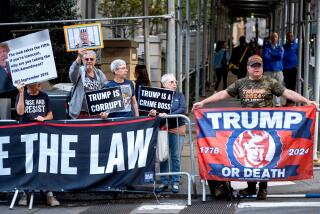Book review: ‘White House Diary’ by Jimmy Carter
Presidents Jimmy Carter and Herbert Hoover might be bracketed together for a number of reasons.
Both were engineers by training, shared an almost theological faith in the chimera of governmental efficiency, believed effective management grew from close attention to detail and were powerfully influenced by their religious upbringings — in Carter’s case that meant the Baptist Church, in Hoover’s Quakerism. Most important, both left office as wretchedly unpopular, one-term chief executives, but then went on to become widely admired (and generally admirable) ex-presidents.
Both also turned out to be genuinely interesting writers: Hoover and his wife translated a Renaissance Latin tract on mining, and he penned the only study of one president written by another, “The Ordeal of Woodrow Wilson.” Carter has written more than 20 books since leaving Washington; “ White House Diary” stands out as a substantial contribution to the history of the presidency. This volume consists of his edited version of the diary he wrote and dictated during his tenure. (The unexpurgated manuscripts are in the Carter Library and open to scholarly examination.) At various points, Carter has interjected italicized afterthoughts in which he revisits his appraisals of events and the people involved. It all makes for a uniquely unfiltered look at what occupying the Oval Office day to day means, as well as a bit of second thinking and score-settling.
One of the things that jumps out with particular force is the way in which unforeseen events come to compete with a president’s own agenda for the finite amount of time and attention available to the chief executive and his team. Carter’s final years in office, for example, are dominated by the crises over the Soviet invasion of Afghanistan and the Iranian Islamists’ seizure of American diplomats as hostages. (Carter’s account of his attitude toward the failed military rescue attempt and his implicit explanations for the reasons it occurred may surprise some.)
Politically speaking, Carter was a legendary grudge holder and his comments aren’t surprising regarding Sen. Frank Church (D- Idaho), whom he particularly loathed; Sen. Scoop Jackson (D-Wash.); and, of course, Sen. Edward Kennedy (D-Mass.), whom he regarded as a son of privilege with an overactive sense of entitlement. The same is true in his appraisals of those involved in what Carter rightly regards as his greatest foreign policy achievement, the Camp David Accords. Here, too, you also see the seeds of Carter’s recent shrill antipathy to Israel and its interests. He found Egyptian President Anwar Sadat a man of broad vision and Israeli Prime Minister Menachem Begin narrow and deceitful. Carter characterizes the Palestinians as people with “rights” and the Israelis as people with “demands.” Over and over, he fails to evince any sympathy for the existential condition of Israeli leaders for whom every aspect of the peace process is a negotiation over their country’s survival. In several instances, he also implicitly taxes American Jews, particularly those in government, with the old dual-loyalty slander. It’s ugly, small-minded stuff.
At other moments, Carter is generously fair-minded. He admired Republican Howard Baker’s bipartisanship, and he calls Warren Christopher, who served as his deputy secretary of state, “the best public servant I had ever known.” Few familiar with Christopher’s career would disagree.
Carter’s description of his press coverage is an interesting example of the way those who opposed him, disappointed him or — in his view — let him down are handled in this volume. In his afterword, he cites among the failings that brought his presidency to grief “my inability to form a mutually respectful relationship with key news media. Because of the United States’ defeat in Vietnam and Nixon’s Watergate debacle, I inherited a suspicious, almost cynical attitude among the press toward the presidency.” That odd mixture of self-deprecation and historically inevitable circumstances-beyond-my-control is supposed to remove the sting of the criticism that follows: In the Carter schema, everybody is at fault, but the other guy is more at fault. Thus, in several diary entries, the president and his staff decry the savagery of their press coverage.
Look a bit closer, though, and the evidence of these pages suggests that what’s being denounced is the fact that all the administration’s coverage wasn’t positive. In an entry on who in the press could be trusted, for example, Carter notes his White House had good relations with Phil Geyelin and the people who ran the Washington Post’s editorial page, and terrible ones with Ben Bradlee and the paper’s news staff. New York Times columnist James Reston, then his paper’s éminence grise, wins the highest Carter rating for trustworthiness.
As far as a reflexively cynical, suspicious press corps goes, there’s this entry from Sept. 28, 1977: Press Secretary “Jody [Powell] and [chief of staff] Hamilton [Jordan] discovered a sweeping news media premise claiming that Vice President [ Walter] Mondale had lost influence within the White House. It was ridiculous, so I called Jack Nelson with the Los Angeles Times and Hedrick Smith with the New York Times, and succeeded beyond my expectations. The following day superb articles came out telling how influential the vice president was.”
Maybe the press in Georgia, where Carter made his political bones, is more accommodating, but when you can call two of the toughest, most influential reporters of their generation and get that sort of result, it’s hard to imagine what a “respectful” relationship might have looked like.
Viewed through one prism, Carter’s presidential record involved remarkable achievements — creation of the departments of energy and education, the Camp David Accords, settlement of the Panama Canal issue, regulatory overhaul and a record of legislative success surpassed only by Lyndon Johnson in the post-war era. Still, his administration ended in failure. In the afterward, Carter explores some of what he believes are the reasons for that and offers President Barack Obama some cautionary advice on pushing too ambitious an agenda, asking Congress to take too many politically costly votes and getting too far out in front of the electorate.
There’s little in this diary about stagflation or the economy — and the fact that little else matters to the American people when they’re out of work and financially insecure. It’s that absence and its consequences that Obama ought to heed.
timothy.rutten@latimes.com
More to Read
The biggest entertainment stories
Get our big stories about Hollywood, film, television, music, arts, culture and more right in your inbox as soon as they publish.
You may occasionally receive promotional content from the Los Angeles Times.






